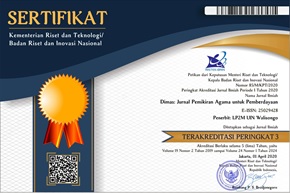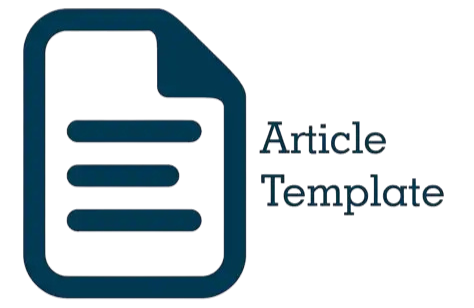Islamic Theological Study of Empowerment Scavenger Community in Cultivating Nature Plastic Waste Becomes Valuable
DOI:
https://doi.org/10.21580/dms.2024.241.20182Keywords:
Islamic Philanthropy, Environmental Theology, Scavenger CommunityAbstract
This article explores the perspective of Islamic theology related to the empowerment of scavenger communities in waste management, especially plastic waste, to increase economic and environmental value. This article also examines the basic principles of Islamic teachings on the environment, social responsibility, and sustainability, and their application in the context of waste management by scavengers. Through literature analysis and case studies, this article identifies the potential for integrating Islamic values with community empowerment practices in waste management through handicrafts made from plastic waste, so that waste that has been considered useless can provide added value for scavengers. The method used is PAR, a method that involves active participation from the scavenger community in every stage of research and development of solutions to overcome their problems. The results of this research are that the first returnee community is given knowledge and skills to process waste, especially plastic waste into valuable handicraft products in the form of Bag and Wallet accessories of various models and shapes. Second, that Islamic teachings that emphasize concern for the environment and community welfare can be a strong foundation for scavenger empowerment programs, including skills training, access to recycling technology, and strengthening social networks. Thus, the Islamic theological approach has the potential to increase the effectiveness and sustainability of waste management efforts, as well as provide economic and social benefits for the scavenger community.
Downloads
References
Abbink, Jon. 2020. “Religion and Violence in the Horn of Africa: Trajectories of Mimetic Rivalry and Escalation between ‘Political Islam’and the State.” Politics, Religion & Ideology 21(2): 194–215.
Avelino, Flor et al. 2019. “Transformative Social Innovation and (Dis) Empowerment.” Technological Forecasting and Social Change 145: 195–206.
Azizy, Jauhar, Sihabussalam Sihabussalam, and Desmaliza Desmaliza. 2022. “Building a Digital-Based (Post-Pandemic) Moderate Muslim Urban Community: Reflection on the Interpretation of Da’Wah Verses.” Akademika : Jurnal Pemikiran Islam 27(2): 191.
Caraway, Rose T. 2020. “The Greening of Cuba? A Case Study in Religion and Permaculture in Santiago.” Journal of Contemporary Religion 35(2): 323–39.
Corner, Adam, Ezra Markowitz, and Nick Pidgeon. 2014. “Public Engagement with Climate Change: The Role of Human Values.” Wiley Interdisciplinary Reviews: Climate Change 5(3): 411–22.
Deneulin, Séverine, and Carole Rakodi. 2011. “Revisiting Religion: Development Studies Thirty Years On.” World Development 39(1): 45–54.
Elhady, Aminullah. 2015. “Muhammadiyah: A Reform Movement for Empowerment and Enlightenment.” In Proceedings of ICIC2015–International Conference on Empowering Islamic Civilization in the 21st Century, , 183–90.
Groce, Nora, Maria Kett, Raymond Lang, and Jean-Francois Trani. 2011. “Disability and Poverty: The Need for a More Nuanced Understanding of Implications for Development Policy and Practice.” Third World Quarterly 32(8): 1493–1513.
Gross, Zehavit, and Rotem Maor. 2019. “Israeli Students’ Understandings of and Attitudes to Human Rights and Literacies.” Human rights literacies: Future directions: 211–34.
Guidi, Riccardo et al. 2021. “Varieties and Changes of Volunteering: Challenges for an International Standard on Voluntary Action.” Accounting for the Varieties of Volunteering: New Global Statistical Standards Tested: 47–78.
Hadiz, Vedi R. 2018. “Imagine All the People? Mobilising Islamic Populism for Right-Wing Politics in Indonesia.” Journal of Contemporary Asia 48(4): 566–83.
Halstead, Mark. 2004. “An Islamic Concept of Education.” Comparative education 40(4): 517–29.
Ten Have, Henk. 2013. “GLOBAL BIOETHICS: TRANSNATIONAL EXPERIENCES AND ISLAMIC BIOETHICS: With Mohammed Ghaly,‘Islamic Bioethics in the Twenty‐first Century’; Henk Ten Have,‘Global Bioethics: Transnational Experiences and Islamic Bioethics’; Amel Alghrani,“Womb Transplantation .” Zygon® 48(3): 600–617.
Hefni, Wildani, Rizqa Ahmadi, and Maslathif Dwi Purnomo. 2022. “Religious Mobility and Identity in the Lives of Urban Muslim Society in Australia: An Anatomy of Religious Practice.” Akademika : Jurnal Pemikiran Islam 27(2): 145.
Liobikienė, Genovaitė, Julius Liobikas, Janis Brizga, and Romualdas Juknys. 2020. “Materialistic Values Impact on Pro-Environmental Behavior: The Case of Transition Country as Lithuania.” Journal of cleaner production 244: 118859.
Mandaville, Peter. 2007. “Globalization and the Politics of Religious Knowledge: Pluralizing Authority in the Muslim World.” Theory, culture & society 24(2): 101–15.
Marshall, Katherine. 2001. “Development and Religion: A Different Lens on Development Debates.” Peabody Journal of Education 76(3–4): 339–75.
Martin, J Paul. 2005. “The Three Monotheistic World Religions and International Human Rights.” Journal of Social Issues 61(4): 827–45.
Noorhayati, Siti Mahmudah. 2017. "Islamic Thought on Gender and Women's Empowerment (Study of Thoughts and Nyai Empowerment Models at the Nurul Jadid Paiton Islamic Boarding School)." academica: journal of Islamic thought 22(2): 219–44.
Osella, Filippo, and Caroline Osella. 2009. "Muslim Entrepreneurs in Public Life between India and the Gulf: Making Good and Doing Good." Journal of the Royal Anthropological Institute 15: S202–21.
Pargament, Kenneth I. 2002. “The Bitter and the Sweet: An Evaluation of the Costs and Benefits of Religiousness.” Psychological inquiry 13(3): 168–81.
Ruslan, Idrus, Muhammad Aqil Irham, and Luthfi Salim. 2023. “Idrus Ruslan 1 , Muhammad Aqil Irham 2 , Luthfi Salim 3 123.” 23(October): 197–218.
Rofhani, Rofhani. 2015. “Middle Class Muslim Urban Culture.” Theosophy: Journal of Sufism and Islamic Thought 3(1): 181.
Rogers, Robin. 2015. “Why the Social Sciences Should Take Philanthropy Seriously.” Society 52: 533–40.
Setiawati, Rini, Dede Mercy Rolando, Robby Aditya Putra, and Osman Koroglu. 2022. “Da’Wah Among Urban Muslims in Indonesia.” Akademika : Jurnal Pemikiran Islam 27(2): 219.
Wafiyah, Ummul, and Ekawati Hamzah. 2023. “Islamic Law and Community Economic Empowerment.” International Journal of Integrative Sciences 2(3): 317–26.
Walter, Tony. 2011. “Angels Not Souls: Popular Religion in the Online Mourning for British Celebrity Jade Goody.” Religion 41(1): 29–51.
Walton, Andrea. 2003. “Teaching Philanthropy in the History of Higher Education: Values and the Public Good.” Journal of College and Character 4(6).
Yuniarti, Lelly, Triando Batara, Herry Garna, and Maya Tejasari. 2023. : “: Research Output; Manuscript; Reference Management; Misconduct; Publication © 2023.” 23(October): 351–70.
Zastrow, Charles, and Sarah L Hessenauer. 2022. Empowerment Series: Introduction to Social Work and Social Welfare: Empowering People. Cengage Learning.
Downloads
Published
Issue
Section
License
Copyright
The copyright of the received article shall be assigned to the journal as the publisher of the journal. The intended copyright includes the right to publish the article in various forms (including reprints). The journal maintains the publishing rights to the published articles. Therefore, the author must submit a statement of the Copyright Transfer Agreement.*)
Licensing

This work is licensed under a Creative Commons Attribution-ShareAlike 4.0 International License.
In line with the license, authors are allowed to share and adapt the material. In addition, the material must be given appropriate credit, provided with a link to the license, and indicated if changes were made. If authors remix, transform or build upon the material, authors must distribute their contributions under the same license as the original.
_______
*) Authors whose articles are accepted for publication will receive confirmation via email and send a Copyright Transfer Agreement.









